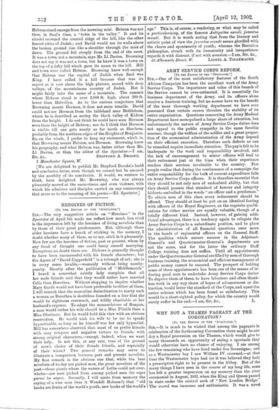HEROINES OF FICTION.
[To THE EDITOR OP THE "SPECTATOR.") Sin,—The very suggestive article on " Heroines " in the Spectator of April 5th made me reflect how much less vivid is the impression left by the heroines of living novelists than by those of their great predecessors. But, although those older heroines have a knack of sticking in the memory, I doubt whether many of them, so to say, stick in it pleasantly. How few are the heroines of fiction, past or present, whom by any freak of thought one could fancy oneself marrying. Exceptions no doubt there are. Dickens is generally thought to have been unsuccessful with his female characters ; but the Agnes of "David Copperfield " is a triumph of art; she is in every sense lovable,—womanly without being namby- pamby. Shortly after the publication of " Middlemarch" I beard a somewhat saintly lady complain that all her male friends said that they would rather have married Celia than Dorothea. Without stopping to inquire whether Mary Garth would not have been preferable to either of them, I will remark that the masculine disinclination to marry such a woman as Dorothea is doubtless founded on a fear that she would be righteous overmuch, and wildly charitable at her husband's expense. To adapt the nomenclature of Bunyan, a man would rather his wife should be a Miss Pliable than a Miss Obstinate. But he would hold this view with an obvious reservation. He would wish his wife to he (so to speak) hypnotisable, so long as he himself was her only hypnotist. Mill has somewhere observed that most of us prefer friends with easy tempers and negative virtues to friends with strong original characters,—except, indeed, when we want their help. Is not this, at any rate, true of the ground of men's choice of their female friends, and especially of their wivesy Two general remarks may serve to illustrate a comparison between past and present novelists. My first remark is the obvious one that, while the best novelists of to-day are picked men, the great novelists of the past—those giants whom the waters of Lethe could not over. whelm—are men picked from among picked men (lee sages parmi les sages). Secondly, I will quote from memory the saying of a wise man (was it Wendell Holmes ?) that "old books are fruits of the world's youth, new books of the world's age." This is, of course, a rendering, or what may be called a particularising, of the famous Antiquitas saculi, juventus mundi. But it is worth noting that from the literary and artistic point of view the jurentus mundi seems glorified with the charm and spontaneity of youth ; whereas the Baconian philosopher, struck with its immaturity and inexperience, regards it with distrust, if not with aversion.—I am, Sir, &c.,










































 Previous page
Previous page